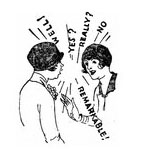
The Lost Art of Conversation
WIT, PLAYFULNESS, IRONY & SATIRE
As ordinary people spend more hours before television screens and computer monitors, as video games and the Internet occupy more and more leisure time, and as academic life develops a greater number of online courses and degree programs, the social art of conversation — human interaction and friendly exchange — diminishes. As participation in these unsociable, isolated diversions increases, the hospitable, gregarious experiences of convivial celebration, robust laughter, and dialogue animated by mirth, wit, and wisdom decrease.
True conversation is not gossip, babble, or the mere exchange of information. Like other purely liberal activities enjoyed for their own sake, conversation encourages the lighthearted, spontaneous play of minds that enjoy the company of others in the round of talk that gracefully jumps from topic to topic in no regular order and moves easily from the comic to the serious, from the ideal to the practical, and from the factual to the anecdotal. Conversation requires no agenda and no Robert’s Rules of Order. Where genuine conversation flourishes, wit, banter, and repartee fill the air; ideas are exchanged and clarified; and wisdom and prudence conveyed. Conversation expands the heart, nourishes the mind, and refreshes the spirit, for man by nature is a social animal who desires to know. While news outlets and information highways relay facts and events, they do not cultivate the common sense, perennial wisdom, or self-knowledge that the art of conversation does.
In his famous biography The Life of Samuel Johnson, James Boswell acknowledges the hallmark of his book: his assiduity “to preserve his [Johnson’s] conversation in an authentick [sic] and lively manner,” and his scrupulosity “by which so many conversations were recorded.” Renowned for his immense learning, remarkable wisdom, lively conversation, and honest talk, Dr. Johnson illuminates the meaning of the art of conversation. His many remarks on the topic indicate a hierarchy of various degrees of conversation ranging from pleasant talk to intellectual invigoration.
First, simple conversation promotes charity, good will, and friendship, and does not demand scintillating wit or learned sophistication. “That is the happiest conversation where there is no competition, no vanity, but a calm quiet interchange of sentiments,” Johnson remarks. When Boswell once complained about the absence of stimulating conversation at a sumptuous banquet, he asked: “Why then meet at table?” Johnson explained that good conversation did not demand intellectual substance: “Why, to eat and drink together, and to promote kindness.” Boswell also records another comment of Johnson that highlights the social, civilizing dimension of simple conversation — not its educational content: “The happiest conversation is that of which nothing is distinctly remembered but a general effect of pleasing impression.”
You May Also Enjoy
What It Means to Be a "Better Person"... Putting a "Positive Light" on Murder?... Crisis Magazine's Guilty Dreams of Glory... Update on Fr. Stravinskas... A Sore Loser?
Resisting the forces of death is only meaningful when we are fully in touch with the forces of life we want to uphold.
By some stretch of the imagination, Buddhism can be chopped down to fit Christianity, but Christianity cannot be chopped down to fit Buddhism.

